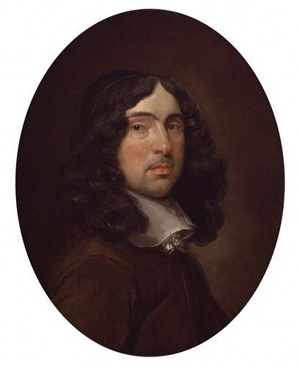Upon Appleton House
Andrew Marvell
i
Within this sober Frame expect
Work of no Forrain Architect;
That unto Caves the Quarries drew,
And Forrests did to Pastures hew;
Who of his great Design in pain
Did for a Model vault his Brain,
Whose Columnes should so high be rais'd
To arch the Brows that on them gaz'd.
ii
Why should of all things Man unrul'd
Such unproportion'd dwellings build?
The Beasts are by their Denns exprest:
And Birds contrive an equal Nest;
The low roof'd Tortoises do dwell
In cases fit of Tortoise-shell:
No Creature loves an empty space;
Their Bodies measure out their Place.
iii
But He, superfluously spread,
Demands more room alive then dead.
And in his hollow Palace goes
Where Winds as he themselves may lose.
What need of all this Marble Crust
T'impark the wanton Mose of Dust,
That thinks by Breadth the World t'unite
Though the first Builders fail'd in Height?
iv
But all things are composed here
Like Nature, orderly and near:
In which we the Dimensions find
Of that more sober Age and Mind,
When larger sized Men did stoop
To enter at a narrow loop;
As practising, in doors so strait,
To strain themselves through Heavens Gate.
v
And surely when the after Age
Shall hither come in Pilgrimage,
These sacred Places to adore,
By Vere and Fairfax trod before,
Men will dispute how their Extent
Within such dwarfish Confines went:
And some will smile at this, as well
As Romulus his Bee-like Cell.
vi
Humility alone designs
Those short but admirable Lines,
By which, ungirt and unconstrain'd,
Things greater are in less contain'd.
Let others vainly strive t'immure
The Circle in the Quadrature!
These holy Mathematicks can
In ev'ry Figure equal Man.
vii
Yet thus the laden House does sweat,
And scarce indures the Master great:
But where he comes the swelling Hall
Stirs, and the Square grows Spherical;
More by his Magnitude distrest,
Than he is by its straitness prest:
And too officiously it slights
That in it self which him delights.
viii
So Honour better Lowness bears,
Then That unwonted Greatness wears
Height with a certain Grace does bend,
But low Things clownishly ascend.
And yet what needs there here Excuse,
Where ev'ry Thing does answer Use?
Where neatness nothing can condemn,
Nor Pride invent what to contemn?
ix
A Stately Frontispice Of Poor
Adorns without the open Door:
Nor less the Rooms within commends
Daily new Furniture Of Friends.
The House was built upon the Place
Only as for a Mark Of Grace;
And for an Inn to entertain
Its Lord a while, but not remain.
x
Him Bishops-Hill, or Denton may,
Or Bilbrough, better hold than they:
But Nature here hath been so free
As if she said leave this to me.
Art would more neatly have defac'd
What she had laid so sweetly wast;
In fragrant Gardens, shaddy Woods,
Deep Meadows, and transparent Floods.
xi
While with slow Eyes we these survey,
And on each pleasant footstep stay,
We opportunly may relate
The progress of this Houses Fate.
A Nunnery first gave it birth.
For Virgin Buildings oft brought forth.
And all that Neighbour-Ruine shows
The Quarries whence this dwelling rose.
[extract]
This poem goes on in this vein for 97 stanzas.
The poem was written for Lord Thomas Fairfax while Andrew Marvell was living at Nun Appleton, where he was tutor to Fairfax's daughter.
